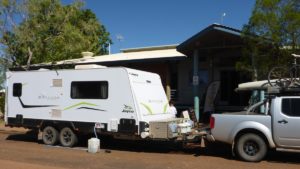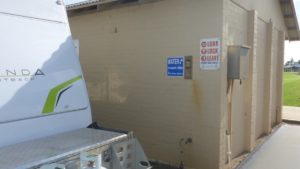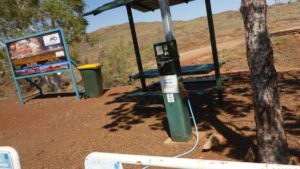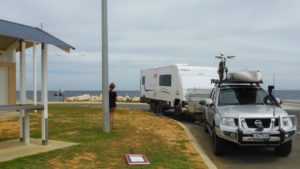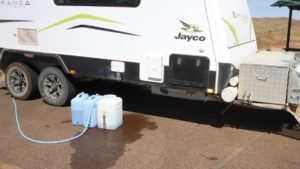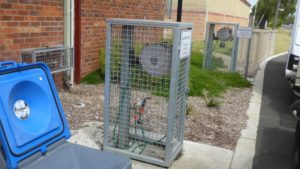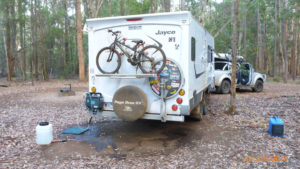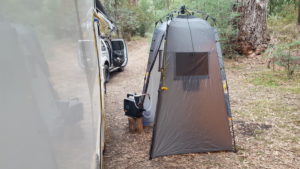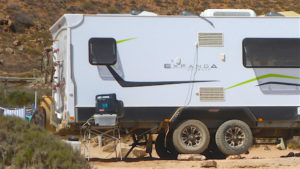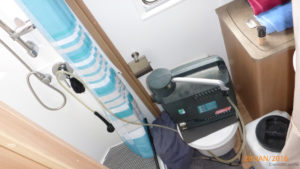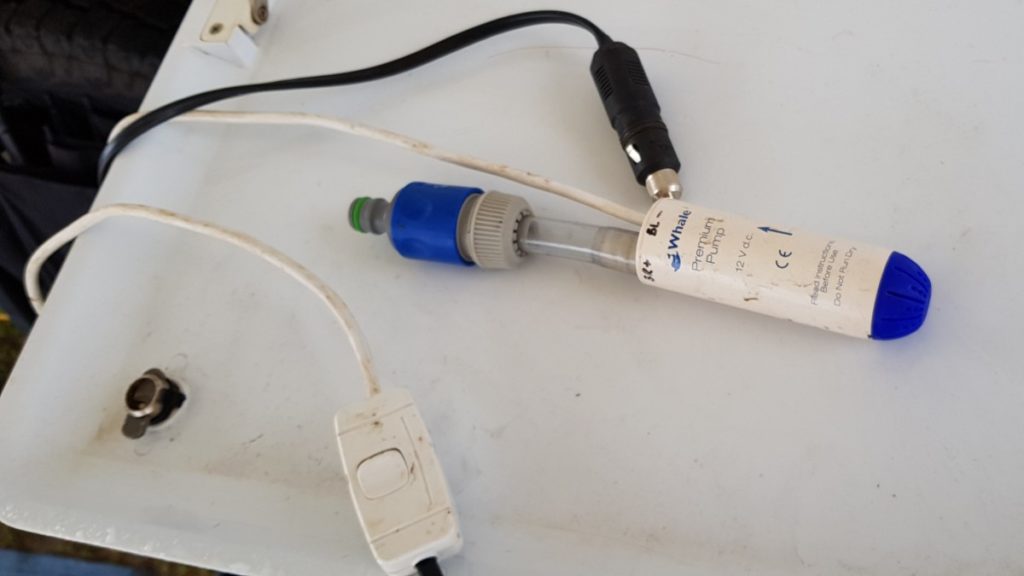Everything About Water
This article is an accumulation of information found throughout our website which combined offers our take on the broad topic of water sourcing, storage, usage and conservation.
The sourcing, storage, usage and conservation of water all play an equal part in freecamp planning. Being under prepared in regards to water, or leaving water to blind luck will at best reduced freecamping to a matter of just a few days and at worst to an hour long depressing sightseeing diversion.
If your plan is to stick to caravan parks then water conservation will never be an issue; and in that case it’s easy to travel with no water tanks at all, or at least no water in the tanks. Many blacktop caravaners never use their water tanks.
Caravan Park travel, and/or road side or rest stop over-nighters are not really what this article is about. This article is more about finding that remote, isolated or breathtaking Utopia after tripping over it and now you simply don’t want to leave, stay as long as possible and to be able to take full advantage of these geographical gems. Being prepared for these oasis’s requires a consistent mindset towards water, and food of course.
We were caught out quite a few times early on by bypassing opportunities to top up, and ultimately not having sufficient water on board when we inevitably chanced on a great camp area. We’ve learnt the hard way to always carry our full compliment of water, and because of that we top up often and whenever we can even if it’s only a handful of litres.
Finding potable water isn’t so difficult, and there’s certainly no secret caravaners code for where it is. Whilst you wont find it in the middle of no-where or in-between towns, water throughout Australia is found in the same basic locations its found at home in the burbs. With some planning and thought potable water is relatively common and sources are widespread. A lot of Tourist Info Centres will have water, as do petrol stations, sports grounds, dump points, boat ramps, local council facilities and toilet blocks, along with many other locations.
The first place to start the local search for water is using a mix of common sense, experience and the Wikicamps phone App. Wikicamps has the ability to filter in or out of any user search those site features which appear across the top of each site type on the map, and potable water is one of those features
We’ll presume you already have Wikicamps before you watch the video below in how to filter your search for potable water Wikicamps. If you don’t have the Wikicamps App and your traveling or planning to travel long term, or planning to do a bit of freecamping …. honestly, pay the $8 for the App because without it you are truly deluding yourself.
Some examples of the places you’ll find accessible potable water sources, some other places meant filling jerrys from a tap and then decanting into the van
We shower every single day, and there is zero tolerance for that not happening. If camping means not showering and stinking like an urban hippie, then camping would not be for me. I live in a world of entitlement, luxury and abundant resources and as a result just because I enjoy camping and remote travel with a caravan in tow does not mean I’m about to forsake any of the modern world wonders that I would ordinarily enjoy without a moments thought with wanton abandon at home. It’s fine for some folk to skip a shower for a few days over a long weekend, or for the odd day during a 2 week Xmas camping holiday. We’ve probably all done it in our youth. It’s very different now because we virtually live on the road and I certainly do not plan to live like that. Living any lesser standard than we would at home is just not for us; it doesn’t have to be, nor should it be.
There are some other options people employ such as Shower in a Can (deodorant), hospital flannel washes, and any number of 3rd world solutions but again these are great for a long weekend but not as a living standard for anyone traveling long term.
Our youthful, freestyle, throw caution to wind days of hedonistic camping are a long way behind us. Whilst caravaning may often be about compromising, it’s never ever about loosing out completely.
Of the many problems stemming from our modern entitled attitude, and the caravan shower is easily the single biggest gobbler for our water supplies. We love remote camping where we are the only people on earth, but without a basic shower it would rapidly loose its appeal. The compromise or adjustment we endure with showering relates only to the method we employ and not the frequency we employ it.
When freecamping for any more than a couple of days, we almost entirely avoid using the onboard caravan shower, it simply uses too much water and more importantly it uses our precious drinking water. Instead we use a lightweight self contained portable gas HWS ….. (and sometimes even with a shower tent with it too). The portable gas HWS not only uses significantly less water, but more importantly we can source the water for our showers from any non-potable supplies without the need to pump it through the vans plumbing, filter it or treat it in any way.
We use an older model Coleman portable gas HWS, but there are plenty of other brands of similar units around. Our Coleman HWS stores nicely out of the way with easy access when required. We generally just set up the HWS on the rear bumper of the van, but occasionally we’re forced to set up the shower tent because of the proximity of the neighbours. On odd occasions we’ve set up the Coleman outside the vans bathroom window and passed the shower rose into the vans shower
We have the normal chassis mounted twin standard water tanks under our van, totaling 164ltrs. We supplement that 160ltrs with 2 x 20ltr plastic jerrys mounted on the drawer bar and a 30ltr water container which lives in the back of the ute, and can double as a grey water tank. Our max potable water storage is around 230ltrs, and that is ample for us.
With the help of the Coleman along with other basic water conservation we can quite easily reduce our water consumption to around 20ltrs per day, so we effectively carry virtually 2 weeks of potable water. In comparison, with a endless supply our water usage is just shy of an 82ltr tank per day. We got this figure from a campground which had only treated tank water and no mains. We could take as much as we liked, so long as we decanted in jerrys. We averaged around 2 x 70ltrs refill trips every other day.
When we cant direct fill the vans tanks with potable water we have a 12v Whale submersible water pump to decant from our jerrys into the vans tanks. The Whale pump is compact, self priming and pumps around 12ltrs/min
It is possible to decant by hand, but that quickly becomes painfully annoying particularly if you are forced to hold the jerry.
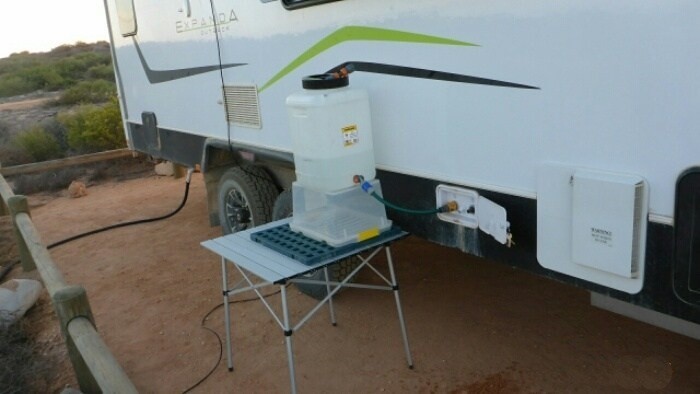
We use the vans front water tank first and top up that tank from the jerrys to slowly take the weight off the front of the back of the car, and we decant the 30ltr water container first so we can use that container to source any secondary water for use in the portable shower.
We have a small inline B.E.S.T. water filter to treat or filter non-potable water and then decant that water into the vans tanks. We have never needed to do that, and I cant see that day ever arriving. The inherent risks as far as we are concerned just aren’t worth it, particularly when simple planning negates any need to. There is plenty of govt researched info listing the potential hazards of ingesting untreated water from Australia’s rivers and streams. Just because alternate water sources are clear, and even running is in no way any indication of its safety to consume. It’s impossible to know what is lying decaying in the river or oozing into in the water just upstream where you cant see. Not all pollution is visible, and toxins and bacteria are invisible to the naked eye. Im not a big fan of fertiliser soup, or rotting cow tea.
Bacteria, parasites and chemicals are common is Australian fresh water sources. Gardia is a very common and very nasty protozoan parasite which is ingested by mouth via contaminated water. Symptoms are like gastro and can take years of treatment to kick the bug.
Australian Geographic article about water bourne toxins and chemicals in Australias waterways
